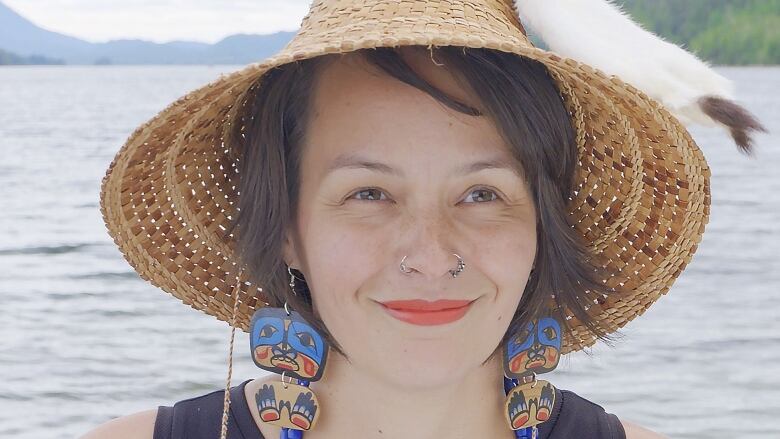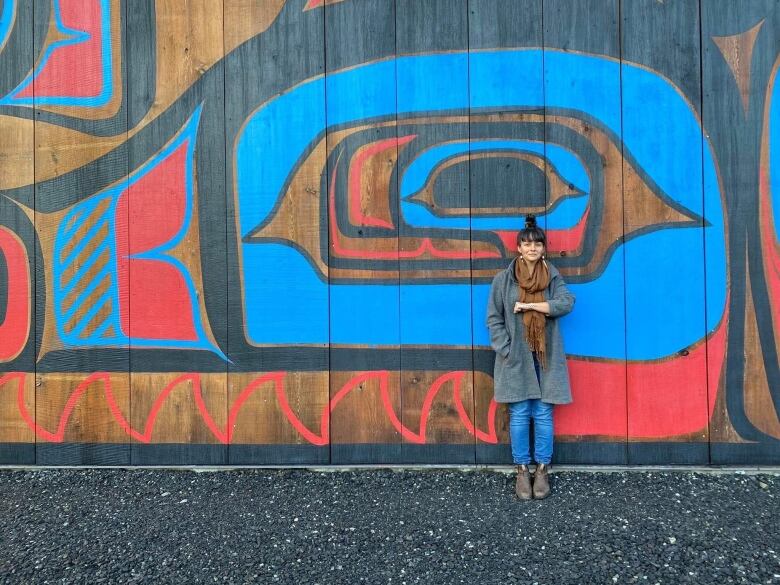Heiltsukwoman unable to restore Indigenous surname on ID because system can't handle its spelling
Jess Hausti facing roadblocks to change her name on her documents, despite promise from government

As Canada launches an expedited process to help Indigenous people reclaim traditional names on government documents, a woman from theHeiltsukNationsaysshe is already facing roadblocks.
That's because officials say government systems can't currentlyincorporate the diacritic marks the accents and symbols used tochange the meaning and pronunciation of words that Jess Hausti considers an essential part of her Indigenous surname.
It means she will have to continue using her anglicized surname, Housty, on official documents until a fix is available which could take two or three years, according to the B.C. government.
"It's particularly frustrating for me, because the reason why I have an incorrect name is because it was anglicized by Indian agents. I didn't create the problem, but I'm not getting any help to fix that," said Hausti, 34, who lives in the Heiltsuk coastal community of Bella Bella, B.C.

ForHausti, herofficial identification has never reflected her true identity.
"I feel that it's important to honour my ancestors and my language by spelling and pronouncing it correctly.I would love for my children to grow up with the correct spelling of their name on their ID," shesaid.
Diacritic marks in Indigenous naming are crucial, according to Prof.Lisa Matthewson, associate head of the University of British Columbia's linguistics department.
"It is literally impossible to convey the sounds of the language using only the English alphabet," shetold CBC News.
System 'limitations'
In June, the federal government announced Indigenous people could apply to use their original names on official documents on an expedited basis and free of charge.
That policy was influenced by a call to action from the Truth and Reconciliation Commission.
B.C. supports the federal government's move to enable Indigenous identification, said Brent Shearer, a spokesperson for ICBC, which issues the province's primary identification of drivers' licences and provincial health cards.
But when Haustiapplied to the provinceto restoreher traditional Indigenous surnamethrough a legal name change, she was told B.C.'s system was unable to accommodate any diacriticalmarks.
"Unfortunately, at this time, systems' limitations do not allow for the accommodation of any diacritical markers for provincial government photo ID," Shearer said. The only way to accommodate Indigenous names likeHausti's is to anglicize them using the Latin alphabet.
For those who were curious about my research into changing my ID to reclaim the correct spelling of my name (which was anglicized by Indian agents generations ago ), both ICBC Fair Practices & inquiries about federal ID = dead ends. pic.twitter.com/esz80yBhgS
—@JessUstiB.C.'s Ministry of Citizens' Services says it'sworking on a solution to the problem, but future system upgradescould take two or threeyears.
Federally,Immigration, Refugees and Citizenship Canada told CBC Newsit can only issue documents printed "in the Roman alphabet with some French characters" because of standards set by the International Civil Aviation Organization.
'Beautifully complex' language
The founding chair of UBC's First Nations and Endangered Languages Program, Patricia Shaw, said she is "deeply dismayed" that Hausti has to fight for the inclusion of a "fundamental foundation for how the language is to be pronounced."
Shaw said the language family that Heiltsuk belongs to is "beautifully complex".
"With the rich inventories of sounds in these languages, they need an enhanced set of alphabetic symbols and diacritics," she said.
Shaw said the omission of diacritics for Indigenous names could be compared to identifyingFrancophone members of parliament without the French accents central to their names.
She said the technological resources needed for government systems to adapt have been available for several years.
"All that is needed is respect, recognition, and the will to act on this," Shaw said.
Hausti says the government has to step up to fix the issue as soon as possible.
"Government talks a lot about reconciliation," she said. "But I'm in a situation where the proper spelling of our name was taken away from us. And the government is not even willing to do the bare minimum to restore it."
Clarifications
- A previous version of this story displayed Jess Hausti's last name as sti. Further orthographic research done by Hausti since this story was originally published indicates the most accurate spelling of her last name in Heiltsuk is Hausti.May 20, 2022 1:43 PM PT












_(720p).jpg)


 OFFICIAL HD MUSIC VIDEO.jpg)
.jpg)



























































































